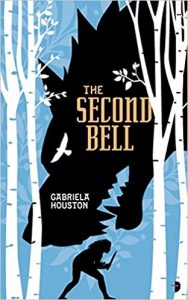The Second Bell and A Language of My Own
 by Gabriela Houston
by Gabriela Houston
I write in a language that is not my own.
It gets more dramatic than that. I think and dream in a language I have no birthright claim on.
I’m Polish, but I write in English, which would often surprise people when I told them of my jobs as an editor, or that I write novels (publishable novels at that!).
“Why don’t I write in Polish?” is the question I’ve been asked many times. After all, I’m not English (or British even).
And sometimes I’d hear the sharp intake of breath and see the raised eyebrows and I would get a feeling a different question was hanging in the air: What claim do I think I have to a cultural space so clearly not meant for me?
The answer to both the questions is complicated. I have lived my entire adult life in the UK. My mother tongue is still there, of course, but it now feels like a foreign country. Or rather a time capsule, forever frozen, unchanging, an inflexible thing. I speak Polish the way I did as a teenager, and over the past 16 years I have noticed the subtle shift in both the vocabulary and syntax of my Polish peers. Shifts I cannot replicate.
Language is a living thing, but for me, my Polish is a snapshot of a time growing ever more distant. And there is some melancholy in that.
But nature despises vacuum and so, as many multilingual people might recognise, when one language wanes, another takes its place.
I believe that the way I—and other authors who choose to write in their second language—write is necessarily dissimilar to how an English person writes. The style and the melody of the language is different. A difference subtle but pronounced, much like my difficult-to-place accent. Salman Rushdie said in a talk I got to attend once, in pre-Covid times, that when you write in your second language, you import the melody of your mother tongue into it. That is not a weakness. It creates a literary flavour that is yours and yours alone.
It will sometimes be felt in the way I communicate with people in the everyday. Polish is an extremely direct language in some ways, without the many layers of politeness preferred by the English speakers. The “could yous” and “would you minds” and all the “pretty please cherry on top” expressions are often left out. But then some of the ways Polish people express themselves can seem almost obtuse, the crux of the story placed way behind the decorative preliminaries. Hyperbole is also beloved by the Polish native speakers, confusing those unfamiliar with the style of the conversation.
Those differences can hinder communication, but when recognised and used judiciously, I’d argue can enhance the writing, adding an element of linguistic surprise, opening a door into a different aesthetic and sensibility.
Of course, there are disadvantages to writing in your second language. Regardless of one’s proficiency, there are certain things which will inevitably be harder to grasp and replicate. Some people struggle most with the articles. Some find themselves reverting to an imported-from-another-place word order.
The thing I found most challenging, but also the most interesting, was the issue of misplacing localised language. By that I mean slang and common-used expressions which are particular to a time and place.
Because a bi/multilingual person is already so set up to assimilate as many new words and phrases as possible, depending on the sort of films I’m into at any given time, I might start saying things like “swell”, “schmuck”, and “happy as a clam” in accents varied, incongruous and entirely mismatched. And while in speech it amuses my family no end, in writing, such a word or phrase parachuted into the prose from the wrong time or place might have the effect of creating a tear in the firmament of your world, and pull the reader out of the narrative, as they wonder why the peasant girl in Russia under the reign of Ivan the Terrible is suddenly talking like Woody Allen.
So, while most writers are generally quite careful with slang as the fastest-ageing of language elements, an author writing in their second language must be doubly so.
As The Second Bell is my debut novel, all of the above was constantly on my mind, especially as it’s set in the land of Slavic mythologies and folklore.
Unencumbered as I was at the time by external validation, I was left free to second-guess every bit of dialogue, every turn of phrase, every linguistic choice.
The impostor syndrome nibbled at my toes, and pulled at my hair and screamed into my ear. Until, that is, it didn’t.
It fell silent, its spurious claims and the niggling doubts it sowed in my mind quietened for a while (they are still there, but I can generally subdue them with enough tea-flavoured comfort).
I didn’t suddenly become infused with Etonian-level confidence, of course, but I suddenly realised I had written a whole novel. A novel in which I brought my Slavic culture into the world of the English language. Where I translated the feelings I have about Slavic mythology and folklore into something that can be read in the language I adopted.
The Second Bell, like me, has Slavic roots and heart, expressed through the English tongue.
For me it helped reconcile the two concepts in my own head. Wherever I go I will be forever a foreigner. And that’s, surprisingly perhaps, quite alright.
Because in the end my voice, in writing or otherwise, is not just Polish or English.
It is mine.
And that is enough.
—
Gabriela was born and raised in Poland, brought up on a diet of mythologies and fairy tales. She spent her summers exploring the woods, foraging and animal tracking with her family. At 19, Gabriela moved to London to study English Literature and obtained a Masters degree in Literatures of Modernity. She has worked as an assistant editor and as a freelance writer. Gabriela’s short stories have been selected for the Editor’s Choice Review by Bewildering Stories and have been featured on the Ladies of Horror Fiction podcast. She lives in London with her husband and two children.
THE SECOND BELL
 In a world which believes her to be a monster, a young striga fights to harness the power of her second heart, while her mother sacrifices everything to stop her…
In a world which believes her to be a monster, a young striga fights to harness the power of her second heart, while her mother sacrifices everything to stop her…
In an isolated mountain community, sometimes a child is born with two hearts. This child is called a striga and is considered a demon who must be abandoned on the edge of the forest. The child’s mother must then decide to leave with her infant, or stay and try to forget.
Nineteen year-old striga, Salka, and her mother, Miriat, made the choice to leave and live a life of deprivation and squalor in an isolated village. The striga tribe share the human belief that to follow the impulses of their other hearts is dangerous, inviting unspoken horrors and bringing ruin onto them all.
Salka, a headstrong and independent young woman, finds herself in a life threatening situation that forces her to explore the depths of her true nature and test the bonds between mother and child…
PREORDER HERE
Category: How To and Tips
























